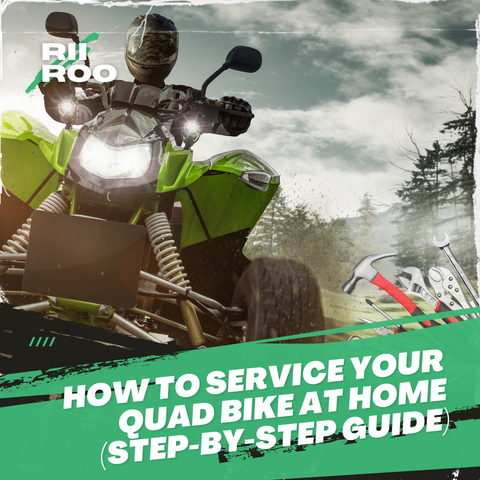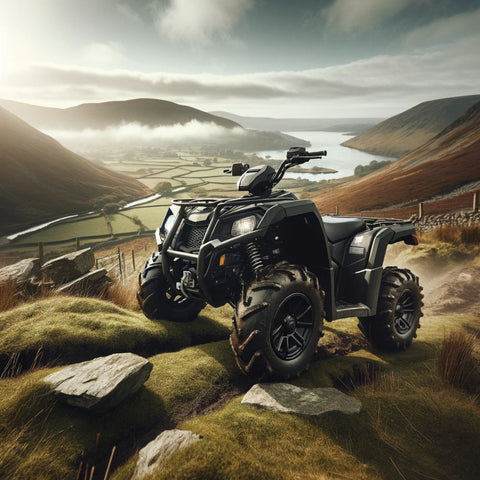
Riding a quad bike can be an exhilarating experience, whether you're tearing through off-road trails or just cruising around the countryside.
But let's not forget, fun comes with a side of responsibility.
Keeping your ride smooth and, more importantly, safe requires a bit of know-how and preparation.
So, let's dive into how you can make every ride a blast without skimping on safety.
Safety First: Gear Up and Skill Up
Training and Experience
Before you hit the gas, let's talk about hitting the books—or at least a training course.
Quad biking isn't just about knowing how to ride; it's about knowing how to ride safely.
If you're new to this, consider taking a safety course.
It's a fantastic way to get up to speed on the basics of quad bike operation, safety guidelines, and yes, even a bit about navigating different terrains.
Think of it as your quad biking 101.
Safety Gear
Alright, now that you're getting the hang of things, let's suit up.
No, we're not talking about a tuxedo.
We're talking helmets, goggles, gloves, and sturdy footwear.
This gear isn't just a fashion statement; it's your first line of defense against potential injuries.
So, wear it with pride knowing you're doing your bit to keep things safe.
Keeping Your Quad in Tip-Top Shape
Proper Maintenance
Imagine this: you're ready to ride, but your quad bike has other plans.
To avoid such heartbreaking moments, regular maintenance is key.
Check the tyres, brakes, lights, and fluid levels to ensure everything's in working order.
A well-maintained bike means fewer surprises and more smooth riding.
Riding Smart: Know Your Limits and the Law
Speed Control and Avoiding Dangerous Maneuvers
Here's the thing—quad bikes can be fast, and sure, it's tempting to see how fast.
But responsible speed control, especially on challenging terrains, is crucial.
Adjust your speed to match the conditions, and avoid those tempting but dangerous maneuvers.
Sharp turns at high speeds?
Sudden acceleration?
Let's leave those to the stunt professionals.
Legal and Safety Regulations
Rules aren't meant to dampen your fun; they're there to keep everyone safe.
Be aware of the local laws and safety regulations regarding quad biking.
This includes age restrictions, licensing requirements, and designated riding areas.
Staying informed means staying on the right side of the law—and safety.
Advanced Riding Techniques
Mastering advanced riding techniques can improve your control and safety on challenging terrains or in difficult weather conditions.
Maneuvering and Handling Tips
Learn the art of balance, especially when navigating turns or uneven terrains.
Practice shifting your weight and using your body to steer and stabilise the quad.
Techniques such as counter-steering or throttle control can significantly impact your ride's smoothness and safety.
How to Ride in Different Weather Conditions
Different weather conditions require specific adjustments in riding style.
In wet or muddy conditions, for instance, reduce speed and use gentle maneuvers to avoid slipping.
In dusty or sandy conditions, maintaining momentum and using appropriate tyres can help in better handling.
Post-Ride Maintenance and Check-Up
After each ride, taking care of your quad bike ensures it stays in good condition and extends its lifespan.
Cleaning Your Quad Bike
- Rinse off mud, dirt, and debris from your quad bike after each ride.
- Use mild soap and water, and avoid direct water on electrical components.
- Regular cleaning not only keeps your bike looking good but also prevents rust and wear.
Routine Post-Ride Inspections
- Perform a quick check of the tyres, brakes, and lights for any damage or wear.
- Check fluid levels and top up as needed. Look for any loose parts or unusual signs of wear and tear.
These routine inspections can catch potential issues early, preventing costly repairs down the line.
The Extras: Being Prepared and Respectful
Terrain Awareness
Part of the thrill of quad biking is exploring the great outdoors, but it's essential to be aware of the terrain and respect the environment.
Stick to designated trails and areas, and avoid disrupting natural habitats.
Remember, we're just visitors in the great outdoors.
Emergency Preparedness
Nobody likes to think about emergencies, but being prepared is half the battle.
Carry essential items like a first-aid kit, tools, and a way to communicate.
Whether it's a mechanical issue or a minor scrape, you'll be glad you have your emergency kit handy.
Riding Solo vs. With a Buddy
While riding solo has its perks, having a buddy along can make the ride even better (and safer).
In remote or isolated areas, it's especially important to have someone who can assist in case of emergencies.
Plus, sharing the adventure makes for great stories later on.
FAQs
Can young riders participate in quad biking, and if so, what are the best practices for ensuring their safety?
Yes, young riders can participate in quad biking, but it's crucial to ensure they are using age-appropriate quad bikes. Safety begins with selecting a quad bike that matches the rider's age, size, and skill level. An adult should always supervise young riders, wear the proper safety gear—including helmets, gloves, and protective clothing—and receive formal training or instruction tailored to their age group. It's also important to educate them on riding within their capabilities and strictly following safety guidelines.
How often should I service my quad bike to keep it in optimal condition?
Regular servicing is key to maintaining the safety and performance of your quad bike. The frequency of service will depend on the manufacturer's recommendations, the model of the bike, and how intensively it's used. For typical use, a good rule of thumb is to have a comprehensive service at least once a year. However, if you use your quad bike heavily or in demanding conditions, more frequent checks and maintenance may be required. Always refer to the owner's manual for specific servicing intervals and adhere to the recommended schedule.
What should I do if my quad bike has been sitting unused for an extended period?
If your quad bike has been sitting unused, it's important to conduct a thorough inspection and maintenance check before riding it again. Start by checking the battery, fuel system, and tyre pressures. Fluids such as oil, coolant, and brake fluid should be checked and replaced if necessary. Inspect the bike for any signs of wear and tear, especially on the brakes, tyres, and lights. It may also be beneficial to clean the air filter and ensure that all moving parts are well-lubricated. If you're unsure about any aspect of getting your quad bike ready after a period of inactivity, consider having it inspected by a professional mechanic.
Get in Touch 🚀
Loved our article on “Keeping Your Quad Bike Ride Smooth and Safe” Got the itch to dive into more wheely-awesome info?
Whether you're a parent or a grandparent, we're here for all your kids ride-on toy questions! 🚗💨
Feeling click-happy?
Jump straight into our wonderland at RiiRoo.com.
Or, if you're more the chatty type, give our Live Chat a whirl and let's talk toys!











Share:
The Advantages and Disadvantages of Quad Bikes
How To Clean Your Quad/ATV The Right Way